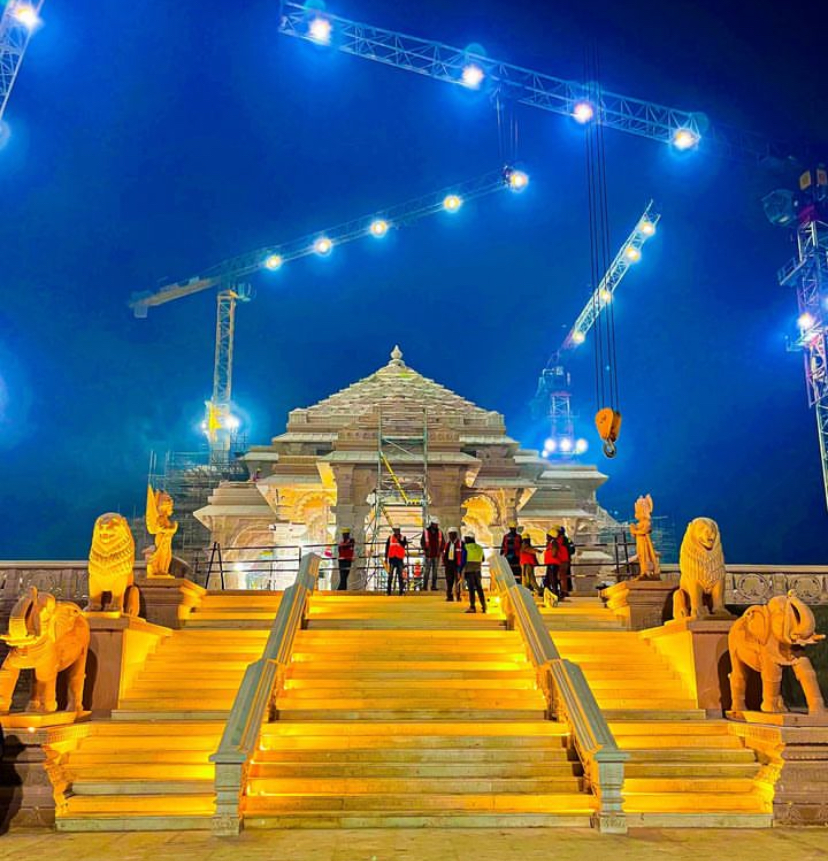Ayodhya: Hindu religious leaders will not attend Modi’s temple inauguration
None of the four shankaracharyas are expected to attend the ceremony on 22 January. The place of worship is not yet completed and its inauguration would violate sacred rules. But two of the four note that they are not opposed to the presence of the prime minister.
Delhi (AsiaNews) – None of the four shankaracharyas,[*] the religious leaders who head the four monasteries founded by Adi Shankara according to the Advaita Vedanta tradition, will be present at the inauguration of the Ram temple in Ayodhya on 22 January. All four are among the foremost spiritual authorities in Hinduism.
The place of worship, which is sacred for Hindus, Buddhists, and Jains, and claimed by Muslims, remains as controversial as ever, and a symbol par excellence of the religious nationalism advocated by the Bharatiya Janata Party (BJP).
The decision to stay away is based on the fact that the ceremony violates the rules of Sanātana Dharma,[†] another name for Hinduism in Sanskrit and other Indian languages, along with the more commonly used Hindu Dharma.
Avimukteshwaranand Saraswati, the 46th head of Jyotish Peeth Monastery in Uttarakhand, says he does not want to attend the ceremony since the temple is still "incomplete" and this violates the rules. This decision is not "anti-Modi" (Indian Prime Minister Narendra Modi) but he “can't participate in an 'anti-shastras' ceremony'.”
Speaking earlier, Swami Nischalananda Saraswati, the Shankaracharya (monastery leader) of Govardhana Peeth, in Puri, also refuses to participate in the consecration (Prana Prathishta) ceremony for the same reason.
In a video on X (ex-Twitter), Avimukteshwaranand Saraswati notes that the decision by the four shankaracharyas is not "anti-Modi" but only expresses their desire to "align and conform to the principles of the holy scriptures" (shastras).
“What is the reason for not going? Not because of any aversion or hatred, but because it’s shankaracharyas’ duty to follow shastra-vidhi (shastra rituals) and ensure that they are followed. And here, shastra-vidhi is being ignored,” he said.
“The biggest problem is that the Prana Prathishta is being done when the temple is still incomplete. And if we say this, we are called ‘anti-Modi’. What is anti-Modi here?" he wonders.
Swami Nischalananda Saraswati, a leading Hindu seer, points the finger at the role played by political figures in a sacred event and, more generally, in religious affairs.
He is convinced that "PM Modi should not partake in the physical installation of the Ram idol" because “the responsibility of consecrating the idol lies with priests and sadhus, not politicians.”
The announced presence of many political figures led him to decline the invitation.
Meanwhile, the other two Shankaracharyas, Dwarka and Sringeri, said that reports that they are against the ceremony are fake news.
In a statement released today, they stress that they have not made any official statement regarding the controversial Ram temple; on the contrary, they define the inauguration as "the culmination of 500 years of struggle" and for this reason it is an event to be welcomed.
Ayodhya has been at the centre of religious tensions and controversies for decades, pitting Muslims against Hindu ultranationalists, until the 2019 Supreme Court ruling that assigned the disputed land to Hindus and alternative land to Muslims to rebuild the demolished Babri mosque.
In August 2020, Prime Minister Modi laid the first stone of the new temple that will be inaugurated on 22 January at the spot believed to be the birthplace of the god Rama.
Nevertheless, supporters of the more extremist Hindutva ideology, have come out against the project, due, among other things, to the involvement of Muslim artists and the inclusion of architectural motifs that are too “Islamic”.
[*] Each represents a cardinal point: Puri (East), Dwarka (West), Badrikashrama (North), Sringeri (South).
[†] Eternal dharma or eternal order.







.png)










